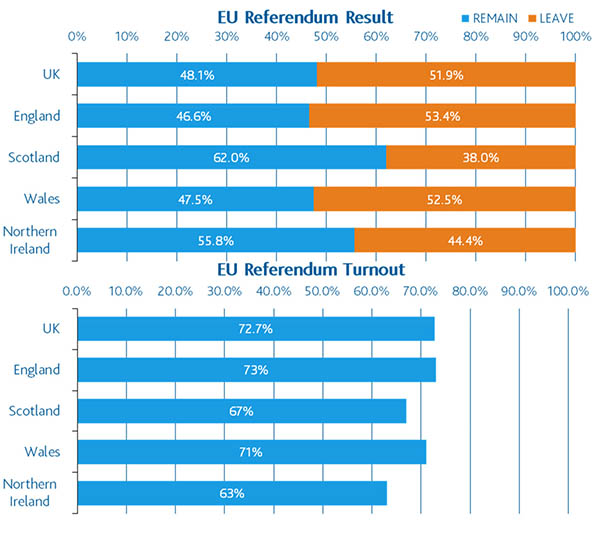So what happens next?
Following Prime Minister David Cameron’s decision to resign, The Conservative Party is now facing a leadership contest. David Cameron’s successor is likely to be announced at the party conference during the first week of October.
Whoever his successor is, she or he will have the unprecedented task of invoking Article 50 of the Lisbon Treaty, the formal mechanism by which a Member State may Leave the European Union (EU).
David Cameron has said that he and his Cabinet will remain in office for the next few months to “steady the ship.” George Osborne will therefore be staying on as Chancellor for the time being but will presumably not be enacting the "Brexit1 Budget" he outlined during the campaign. Any admission that the fiscal rules will be missed as a result of "extenuating circumstances" will therefore be one for the next Chancellor.
The stark contrasts in voting patterns across the countries and regions of the UK suggest that there may be longer-term institutional and constitutional implications for the country, which could also have macroeconomic impacts.
Nicola Sturgeon, Scotland’s First Minister, has already made clear that with Scotland voting overwhelmingly to remain, the result is indeed the "material change" she had previously insisted could lead to a second independence referendum.
Without offering a clear timeline, the First Minister said that a second ballot “is definitely on the table.” She plans to lay primary legislation in the Scottish Parliament required to host another referendum when it decides to do so.
Source: BBC
The next three months: business as usual (sort of)
David Cameron heads to the European Council meeting in Brussels on Tuesday, where the implications of the result, not only for the UK but also the wider European Union, will be top of the agenda.
Bank of England Governor Mark Carney has also spoken, emphasizing the Bank’s liquidity facility and its intention to do whatever is needed to maintain financial stability. The Bank’s Monetary Policy Committee (MPC) is next scheduled to meet on July 14. Mark Carney made it clear that they could act earlier if the market and macro backdrop merited it, though the potentially greater complexity of the post-Leave policy challenge they face means they are likely to prefer to lean on liquidity measures if they can continue to do so.
The UK will remain a member of the EU and retain access to the Single Market for some time to come, with existing rules and regulations staying in place. David Cameron stated that the process of triggering the UK’s exit via Article 50 of the Lisbon Treaty will be a decision for his successor. The subsequent exit could take up to two years to deliver.
Macro impact over the next 12-18 months: uncertainty is the key issue









